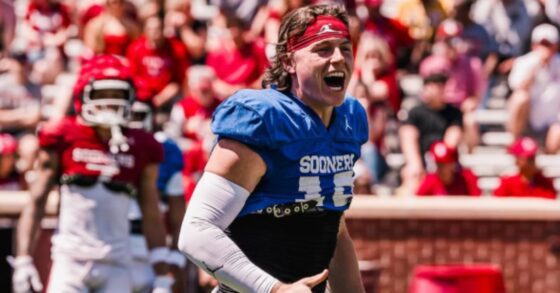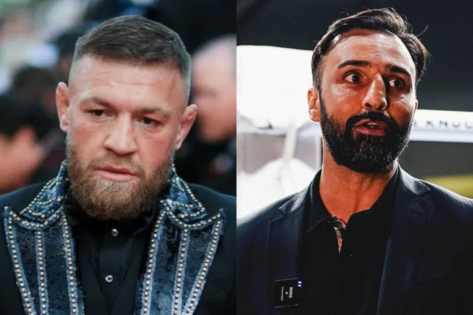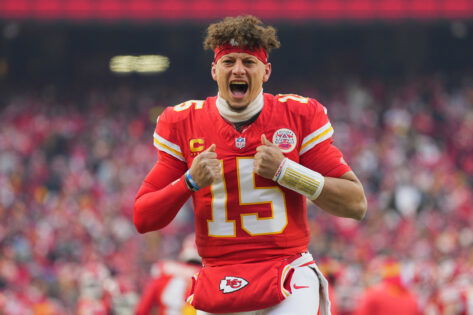John Mateer, the new quarterback for Oklahoma, has found himself in deep water surrounding a major controversy. It all started late Monday when some screenshots surfaced on social media purportedly showing Mateer’s Venmo account with payments labeled “sports gambling.” That portrays bets related to high-profile games like UCLA vs. USC back in 2022 during his time at Washington State. The screenshots accusing Mateer of alleged involvement in sports gambling quickly went viral. The potential NCAA rule violations stirred up a storm because college athletes are strictly forbidden from betting on college sports.
The immediate aftermath saw someone delete Mateer’s alleged Venmo transaction history. That, in turn, only fueled the suspicion. Oklahoma officials confirmed they are aware of the situation. But Mateer himself has denied ever gambling. He assured the university of his compliance with NCAA rules. As of now, no one has officially confirmed the authenticity of the Venmo screenshots. That leaves a cloud of uncertainty hanging over the case. But if the NCAA wishes to dig deeper, it can just refer to some of its past cases and use a different angle to verify this allegation against the QB.
The NCAA takes gambling allegations seriously. Remember the Iowa State scandal? In a recent discussion between On3’s Andy Staples and an OU insider, they talk about the various paths of investigation where they can prove Mateer to be guilty. Because the Venmo transaction alone wouldn’t prove a thing. “The NCAA, I’m sure, is aware of it in some capacity,” the insider stated on the On3 YT channel. “And do they look into other stuff? You know, you think back to the Iowa State and Iowa scandal where they found those guys had, was it DraftKings accounts, I think.” Back in 2023, Iowa State quarterback Hunter Dekkers found himself in the eye of a major sports gambling scandal. It all started with an investigation by Iowa state authorities that revealed Dekkers had placed hundreds of bets through a DraftKings sportsbook account. His mother’s name linked that.
NEW: Oklahoma is aware of John Mateer’s Venmo transactions and is handling it, @GeorgeStoia reports.
“Mateer made it clear to the school that he has never gambled.”
Intel: https://t.co/VvfgHtlFwu pic.twitter.com/ch5RFwVerR
— On3 (@On3sports) August 12, 2025
Now, coming back to the Mateer situation, an OU insider speculates on one thing. “Could they go and look and see if John does have an account somewhere else or somebody, you know, that he’s paying to,” he said. “It’s like they’re not going to prove anything with the Venmo account. But does it lead to a paper trail or something else? I don’t know. I really think nothing’s going to come of this other than a fun internet story and a meme. And he’s probably going to catch a lot of crap for it on the road this year in the SEC. And on college game day.” The Iowa State scandal has revealed how intricate these investigations can get, involving legal charges like tampering with records, underage betting laws, and tracing bets through accounts meant to conceal identity.
For Mateer, the NCAA would likely scrutinize account histories, communications, link payments to actual bets, particularly on NCAA games, and look for patterns or connections that show intent and participation. In the social media era, Venmo payments and digital footprints can spark rapid rumors and dramas. But institutional football regulators have to back their actions with undeniable proof. Investigators have tools to track such financial footprints beyond simple screenshots. They can cite bank records or look at connected accounts, as the authorities did in the Dekkers scandal. On the flip side, this whole episode might just end as an internet meme or a “fun story” rather than a scandal with real consequences. Without hard evidence that proves Mateer bet or paid someone else to do so under his name. Weighing in on the skepticism and controversy, CBS Sports’ Shehan Jeyarajah stated, “Those Venmo receipts definitely aren’t actually him sports gambling, but just in general, it is very funny that Venmo transactions are public. There’s really zero good reason for it. Let us have our bizarre collection of inside joke emojis in peace.” For now, all eyes remain on relevant official proceedings, which will determine if this is a fleeting rumor or a full-blown scandal.
When sports books become detectives
Dekkers’ case showed that before you can genuinely penalize a player, investigators must uncover solid evidence. And not just ambiguous transactions labeled as “sports gambling.” But if deeper digging uncovers real betting. And especially in his college games, it could put his entire playing status in jeopardy. “If there’s something to be found in this type of situation, like the Hunter situation at Iowa State,” Andy Staples added. “It’ll get found. Because the schools subscribe to these services that check everything. The sports books, I guarantee, are now looking back at all the Washington State games. Looking back at history and that sort of thing have a financial interest in making sure that the games aren’t fixed.”
He continues, “So they’ll go into it deep, probably deeper than the NCAA ever could. If there was something to be found, it’ be found.” Authorities caught Dekkers not only because there were bets linked to him but also because they found a tangled web of accounts. That includes those used by family members and evidence of tampering with records to hide the activity. This kind of deep probe wasn’t surface-level; it was months of sniffs, tracking, and financial forensics. Now, fast forward to today’s world of sports betting and monitoring. Schools and leagues subscribe to sophisticated services that continuously monitor betting markets and suspicious activity.
Companies like Stats Perform and Genius Sports provide real-time surveillance of betting patterns across thousands of games. They analyze odds movements, betting volumes, and even social media chatter. This data flags any unusual spikes or shifts that might hint at something fishy. These services offer a layer of protection and vigilance far beyond what the NCAA might do alone. Why? Because sportsbooks themselves have a massive financial incentive to keep games clean and avoid fixing scandals. What does this mean for someone like Mateer? If he or anyone connected to him was placing bets through some other account or paying someone else to bet on his behalf, the financial trails and betting activity wouldn’t just disappear. These systems catch patterns, link accounts, and alert right away if something’s off.
The post Severe Consequences Await John Mateer as OU Insider Warns QB of 1-Year Limbo in Venmo Saga appeared first on EssentiallySports.



